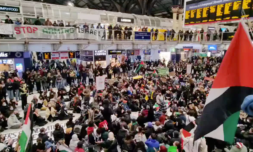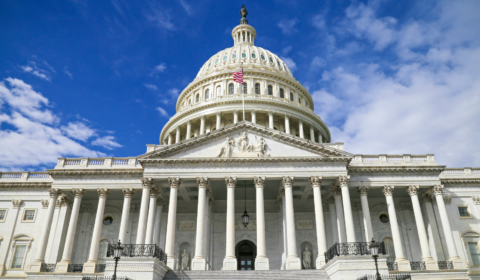What are the protestors’ main goals?
Columbia University Apartheid Divest (CUAD) is the group leading the protests.
Formed in 2016, CUAD advocates for Columbia and Barnard College, and is asking both institutions to disclose their investments and divest from firms supporting Israel’s military operations in Gaza.
Along with divestment, CUAD has raised five other demands.
It calls for an immediate ceasefire in Gaza, a halt to Columbia’s dual degree programme with Tel Aviv University, an end to Israel’s oppression of Palestinians in the West Bank and Jerusalem, and an end to its illegal occupation of Palestinian territory.
Across the country, students from other universities have mirrored the movement at Columbia.
NYU students are calling for the closure of the university’s Tel Aviv campus and for the institution to ‘divest from all corporations aiding in the genocide,’ specifically targeting weapons manufacturers and banning weapons tech research that benefits Israel.
Additional protests are also taking place at Yale University, Cornell University, the University of North Carolina, Miami University, and Temple University in Philadelphia, and more.
The feelings of young people in America
University students have felt compelled to act in light of the U.S. government’s continued support for Israel, which receives $3.8 billion in military assistance each year.
Despite global outrage, President Joe Biden has maintained strong backing for Israel during the Gaza war. He recently approved a substantial funding package to provide an additional $17 billion in aid.
At a protest on NYU’s campus, 25-year-old PhD student stated:
‘As students who are being taught in class about colonialism, about Indigenous rights, about the effect of non-violent protest across history, it would be extremely hypocritical — or it would totally undermine the point of our education — if we didn’t act.’
Also fuelling the protests is the Israeli military’s attacks on Palestinian students, teachers, and academic institutions in Gaza.
In recent days, United Nations pointed out that 87 percent of schools in the Palestinian territory have been damaged or destroyed since the IDF began its assault on Gaza in early October.
This violence has resulted in the deaths of nearly 5,500 students, 261 teachers, and 95 university professors.
The UN representatives questioned whether this was a calculated attempt to ‘comprehensively destroy the Palestinian education system,’ labelling it ‘scholasticide
Concerns grow over antisemitism
US media reporting has fuelled concerns about antisemitism at the protests.
However, such incidents have been widely reported as carried out by outsiders who joined the protests rather than university students.
Regardless of where the hate speech is coming from, it has understandably caused Jewish students to report feeling unsafe on their campuses.
Taking precautionary measures, Columbia University shifted to remote learning on April 22nd.
Responding to reports of hate speech at the protests, President Joe Biden stated, ‘This blatant Antisemitism is reprehensible and dangerous — and it has absolutely no place on college campuses, or anywhere in our country.’
Biden’s words were met with criticism from those who argued he had ‘painted all protestors with the same brush’ and failed to distinguish antisemitic rhetoric from justified criticism of Israel’s policies.
Unsurprisingly, Israeli Prime Minister Benjamin Netanyahu mischaracterised the protests, suggesting ‘antisemitic mobs have taken over leading universities,’ and likening them to Nazi rallies in Germany’s early 20th century.
Meanwhile, Israeli citizens who oppose the war in Gaza have been protesting outside Netanyahu’s house.
Is police interference an attack on free speech?
This is a tricky situation for America’s universities, which have long upheld free speech policies similar to the First Amendment.
These policies essentially allow any kind of free speech unless it leads to direct violence or threatening behaviour. In recent months though, universities have been forced to re-think their stance on free speech as political tensions continue to mount.
All in all, student protestors believe that an immediate divestment is not just about penalising companies involved in oppression. They believe it would also represent a symbolic victory in the wider struggle for social justice.
Still, as of today, no universities have publicly committed to divestment from Israel-linked firms – and experts believe that most will be reluctant to do so.
As the nationwide protests continue, they depict an interesting and clear picture of the challenges major institutions are faced with when young people rise up together against injustice.





















